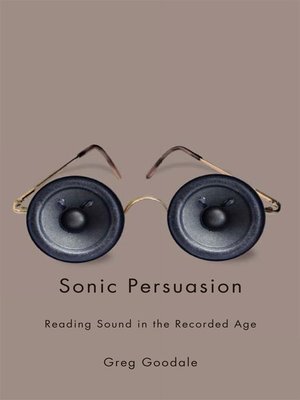Sonic Persuasion
ebook ∣ Reading Sound in the Recorded Age · Studies in Sensory History
By Greg Goodale

Sign up to save your library
With an OverDrive account, you can save your favorite libraries for at-a-glance information about availability. Find out more about OverDrive accounts.
Find this title in Libby, the library reading app by OverDrive.



Search for a digital library with this title
Title found at these libraries:
| Library Name | Distance |
|---|---|
| Loading... |
Sonic Persuasion: Reading Sound in the Recorded Age critically analyzes a range of sounds on vocal and musical recordings, on the radio, in film, and in cartoons to show how sounds are used to persuade in subtle ways. Greg Goodale explains how and to what effect sounds can be "read" like an aural text, demonstrating this method by examining important audio cues such as dialect, pausing, and accent in presidential recordings at the turn of the twentieth century. Goodale also shows how clocks, locomotives, and machinery are utilized in film and literature to represent frustration and anxiety about modernity, and how race and other forms of identity came to be represented by sound during the interwar period. In highlighting common sounds of industry and war in popular media, Sonic Persuasion also demonstrates how programming producers and governmental agencies employed sound to evoke a sense of fear in listeners. Goodale provides important links to other senses, especially the visual, to give fuller meaning to interpretations of identity, culture, and history in sound. |
Cover
Title Page
Copyright Page
Contents
List of Illustrations
Preface
1. Reading Sound
2. Fitting Sound
3. Machine Mouth
4. The Race of Sound
5. Sounds of War
6. On Sound Criticism
Notes
Index
| "Compelling and imaginative case studies—air-raid sirens, Warner Brothers cartoons, and clocks—ground this sonic investigation, but just as important is Goodale's work in interpreting sounds as opposed to merely placing them in a larger historical narrative. A major contribution to the study of music, communications, sound, and rhetoric."—John M. Picker, author of Victorian Soundscapes
"Goodale's book helps us acquire a ... much-needed sonic literacy."—Technology and Culture
| Greg Goodale is assistant professor of communication studies at Northeastern University and the coeditor of Arguments About Animal Ethics.
"An important book."—IEEE Technology and Society Magazine
"Goodale's book helps us acquire a ... much-needed sonic literacy."—Technology and Culture
| Greg Goodale is assistant professor of communication studies at Northeastern University and the coeditor of Arguments About Animal Ethics.







